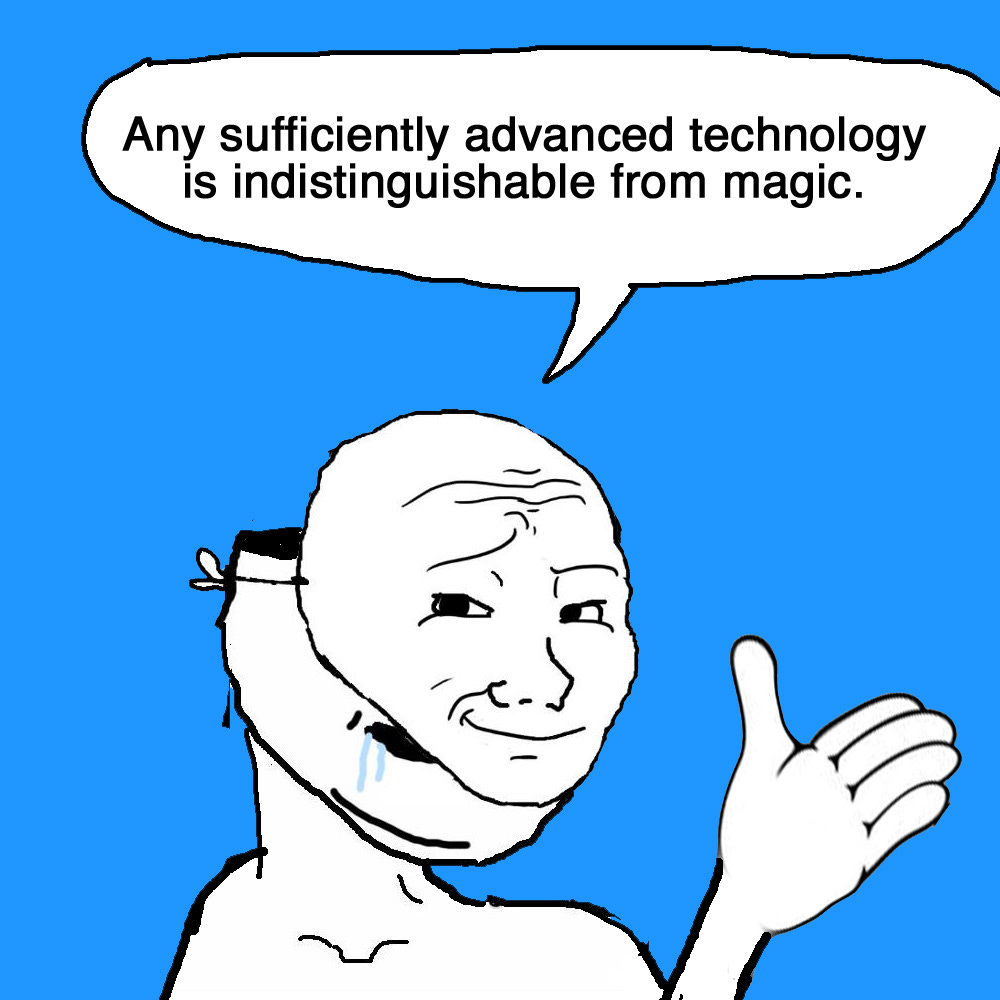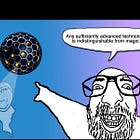Don't Use Clarke's Third Law To Retcon the Arts.
Cut this cancer brainlet meme out. Use it where it was specifically intended.
This is really just a passing thought as I have better things to do with my time than unpick a lot of stale nonsense people wave about, but I was recently prompted to consider where this stupid meme came from that we’ve all seen floating around.
"Any sufficiently advanced technology is indistinguishable from magic."
I found out it comes from science fiction writer Arthur C. Clarke, and it's referred to as Clarke's third law.
I’m not going to get into Clarke himself here, other than I’m not a fan and share the concerns that have been raised over his life, but Clarke’s third law is something like you have an alien race that visits Earth with a tech so advanced that we can't comprehend it, therefore it "might as well be magic" to the human condition. Or like taking an iPhone back in time 400 years or so and showing it to people then.
It has an axiomatic quality.
We all get the concept. The problem—where it exists—is retroactively nominating prior works (fiction/art/whatever) about magic as now being about, or at least simultaneously about technology—a conspicuously illiterate pursuit in itself—because these people have discovered Clarke’s third law. This casual memeing—if we bother to analyse it—would rely on omitting inconvenient information and making incorrect assumptions.
I can’t police what stupid memes people glue themselves to seek approval for. No doubt they have seen others throw this meme about online believing it confers sophistication, copying it, seeking to shape themselves to it and perhaps there is little harm in an exercise so misdirected and fruitless. (And I think what they actually mean is ‘power’, not technology).
But what needs to happen is a move in the opposite direction. Aside from being a misapplied hot take meme, it creates a new layer of obfuscation, misunderstanding and doubt around works, which in some cases are already not that easy to understand for uninitiated audiences today, and already under huge buckling pressures of political correctness, rewriting these works themselves yet again. Nothing is gained. Things are just taken away.
Clarke’s third law needs to be actively set aside in interpretations of the arts unless it—or some proto-iteration of it— is specifically intended to play a role in the work.
Like I said this is more a line of thought that appeared after seeing some really stupid stuff on here than anything else. I have to speculate on their reasoning, which is a waste of my time, as it’s almost certain there isn’t any. They have never actually thought about it at all so one has to create a reasoning for them.
I may or may not write more if I can be bothered as I see a lot of issues with this. Let me know. But let’s begin with the first problem for today.
Lying about what you know, ignoring other positions
Take some hypothetical story written a long time ago where magic plays a role in the story. Not magic that turns out to be a (technological) illusion like Scooby Doo—where we can point to an explanatory value of Clarke’s third law, or where there is some deliberate blurring of the two, or where it’s intentionally left unclear, but that magic—meaning non-rational, non-technological processes, characters and events intended to be unphysical, are an accepted condition of the story itself.
By definition, Clarke’s third law only applies to the position of the receiver. There is no Clarke’s third law if the ignorant receiver isn’t the only party.
From a privileged position—in this case the audience—it doesn't apply because we are privy to cause and effect and the nature of what’s happening. As the audience we are also party to the wielder as well as other characters that may see things the receiver doesn’t, or be privy to other facts the receiver isn’t.
To claim that works about magic are interchangeable with the theme of technology because of Clarke’s third law, the person would have to claim that only the receiver’s frame is known, even though they know far more. They have to lie, scrubbing out the audience and wielder (and possibly other characters) who occupy privileged positions and not subject to Clarkes’ third law.
Clarke’s third law—and Clarke was a rationalist—is not a statement about magic itself, only an observation about the unprivileged frame of the receiver. It stops being applicable outside of that unprivileged frame.
Outside of the unprivileged frame, events are no longer indistinguishable.
Part 2:
Part 3:
or send me your bitcoins: bc1qy2gdzdqxeunvex3875kf6nuguvxrvmmhcfyz3k






